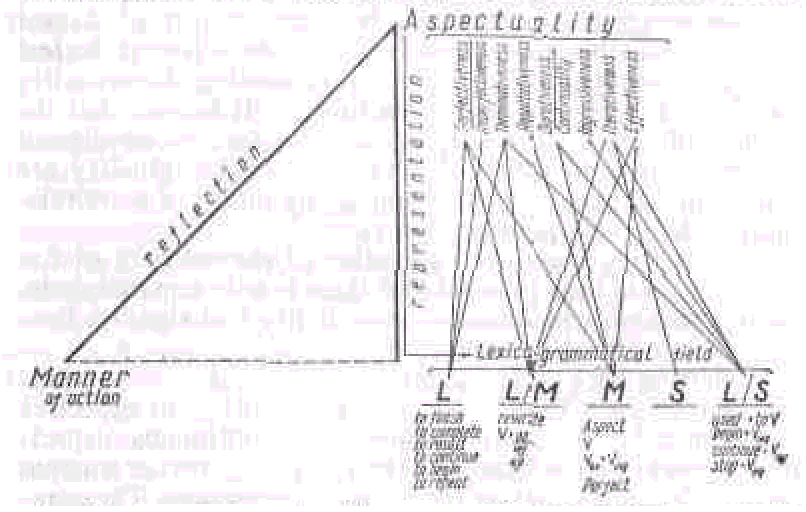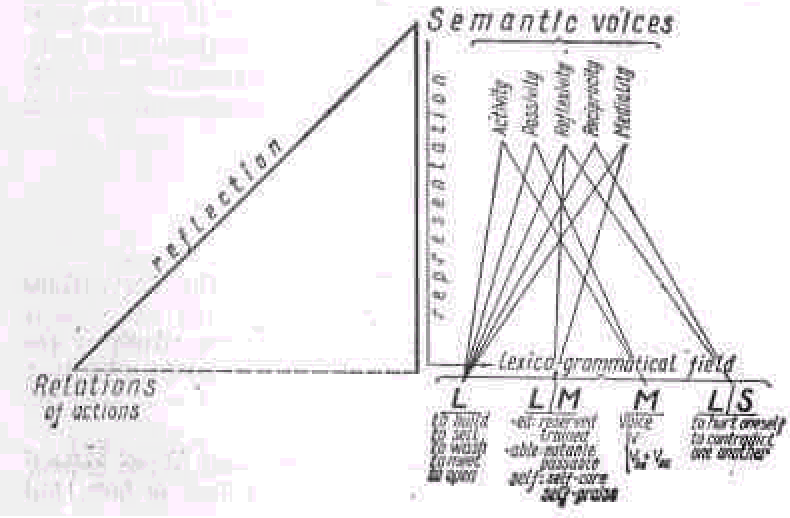
- •Realisation of grammatical categories of the verb II
- •Aspect: definition and characteristics
- •2.The category of voice. The lexico-grammatical field of
- •3. Categorial voice opposition: active vs passive
- •4. The problem of reflexive, reciprocal, middle voice
- •5. General Characteristic of the Category of Mood
- •6. To the problems of the Imperative Mood
- •7. Subjunctive Mood: Overview
- •I.Khlebnikova divides Subjunctive into 3 types
- •The Category of Mood: Theories and Approaches.
- •Scheme commentary (attached below).
I.Khlebnikova divides Subjunctive into 3 types
conditional should + Infinitive
would + Infinitive
subjunctive be, were, if I knew
Non-systemic variants → all the rest
e.g. However hard it may be
Prof. B. Ilyish paid much attention to the study of the peculiarities of the Subjunctive Mood. He emphasized the fact that many of the forms coincide with the forms of the Indicative Mood with definite shift in meaning. Thus the homonymity of forms on the one hand and the existence of a number of forms to express the same meaning (e.g.unreality) cause the difficulties connected with the Subjunctive Mood.
P A R T 2
Study questions and projects
The Category of Mood: Theories and Approaches.
Scheme commentary (attached below).
P A R T 3
Sentence parsing
Identify predication lines to divide the sentence into constituent parts.
Make a scheme to show the relations between sentence parts.
Define the constituents of each sentence.
Leonie, who’d only the previous morning told a Pekinese-owning client in the veterinary practice where she worked as a nurse, that dogs were terrible blackmailers and that little Kibutshi shouldn’t be given human food no matter how much he begged at the table at mealtimes – hurried into the kitchen for Mixed Oval and a digestive biscuit for her favorite Labrador.( Kelly C. Someone like You. – Harper Collins, 1998. – P.35)
Together they’d filled a bin-bag with old Mizz magazines, cuddly toys that even Penny no longer wanted to chew, old pens with no lids and copybooks with half the pages torn out; as a consequence their room looked so tidy it was unlikely to be identified as the bedroom of two pop star obsessed fourteen-year-olds – apart from the dog-eared poster of Robbie Williams that Mel had refused to be parted from. (Ibid., P. 37)
“I know,” Leonie lied, feeling terribly foolish and sorry she had broken her golden rule about not letting the children know how terrible it was for her when they spent time with their father and it wasn’t that she begrudged Ray time with his children: not at all, she simply missed them so much when they were staying with him and Boston seemed such a long way. (Ibid., P. 37)
Leonie knew she couldn’t bear another holiday in the big rented bungalow with the ‘gang’, as Anita called the group who’d been together for over twenty years since they’d met up as newlyweds all in Sycamore Lawns, as gangs were fine when you were part of it in happy coupledom, but when you were divorced and everyone else was still in happy coupledom, it wasn’t as easy. (Ibid., P. 38)
It didn’t matter that she was sitting in the balmy night air with the vibrant city of Luxor yards away and the treasures of the Nile waiting to be explored: she was on holiday with her father and he was going to ruin everything. (Ibid., P. 73)
S CHEME
2
CHEME
2
SCHEME 3

